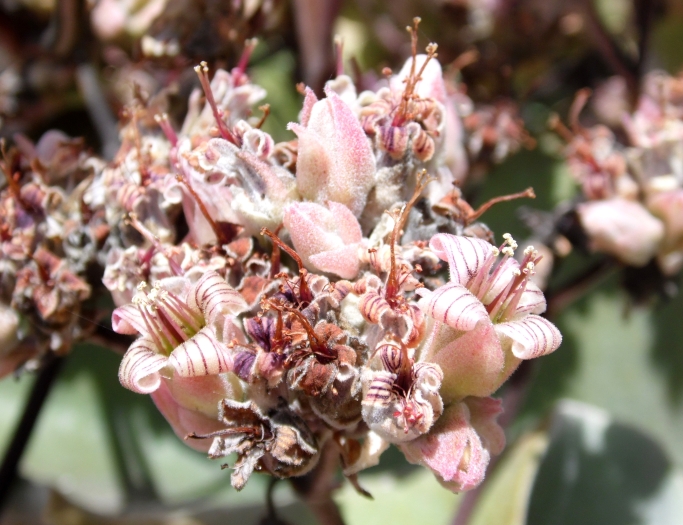Elephant’s Ear Kalanchoe
(Kalanchoe beharensis)
Elephant’s Ear Kalanchoe (Kalanchoe beharensis)
/
/

Krzysztof Ziarnek, Kenraiz
CC BY-SA 4.0
Image By:
Krzysztof Ziarnek, Kenraiz
Recorded By:
Copyright:
CC BY-SA 4.0
Copyright Notice:
Photo by: Krzysztof Ziarnek, Kenraiz | License Type: CC BY-SA 4.0 | License URL: https://creativecommons.org/licenses/by-sa/4.0 | Uploader: Kenraiz | Publisher: Wikimedia Commons | Title: Kalanchoe_beharensis_kz1.JPG | Notes: Imagen de Kalanchoe thyrsiflora Author: I, the creator of this work, hereby release it into the public domain. This applies worldwide. In case this is not legally possible, I grant any entity the right to use this work for any purpose, without any co






























Estimated Native Range
Summary
Kalanchoe beharensis, commonly known as Elephant’s Ear Kalanchoe, is an evergreen succulent native to the rocky and sandy terrain of southern Madagascar. It typically grows 3–5 ft (1–2 m) tall and is characterized by its large, velvety, triangular leaves with crenate margins and a distinctive felt-like texture due to dense trichomes. These trichomes have striped cuticular ornamentation, providing an attractive silver-gray to blue-green hue. The plant produces small, yellowish-green flowers on short pedicels during the spring to summer blooming season, although the flowers are not particularly showy compared to the foliage.
Elephant’s Ear Kalanchoe is valued for its unique foliage and architectural form, making it a popular choice for succulent gardens, xeriscaping, and as a potted houseplant. It is also appreciated for its low maintenance requirements and resilience to neglect. This species thrives in full to partial sun and prefers intermediate to warm temperatures, ideally above 5 °C (41 °F). It is somewhat frost-tolerant but should be protected from severe cold. Well-draining soil is crucial, and a mix of loam, sand, and gravel is recommended for optimal growth. Overwatering is a common issue; the soil should be allowed to dry out before watering again. During the growing season, water every 14–20 days, and reduce watering in the winter. Propagation can be achieved through seeds, stem cuttings, or leaf cuttings, with the latter requiring the midrib to be notched before planting in sandy substrate.CC BY-SA 4.0
Elephant’s Ear Kalanchoe is valued for its unique foliage and architectural form, making it a popular choice for succulent gardens, xeriscaping, and as a potted houseplant. It is also appreciated for its low maintenance requirements and resilience to neglect. This species thrives in full to partial sun and prefers intermediate to warm temperatures, ideally above 5 °C (41 °F). It is somewhat frost-tolerant but should be protected from severe cold. Well-draining soil is crucial, and a mix of loam, sand, and gravel is recommended for optimal growth. Overwatering is a common issue; the soil should be allowed to dry out before watering again. During the growing season, water every 14–20 days, and reduce watering in the winter. Propagation can be achieved through seeds, stem cuttings, or leaf cuttings, with the latter requiring the midrib to be notched before planting in sandy substrate.CC BY-SA 4.0
Plant Description
- Plant Type: Shrub, Succulent
- Height: 3-5 feet
- Width: 3-5 feet
- Growth Rate: Slow
- Flower Color: N/A
- Flowering Season: Spring, Summer
- Leaf Retention: Deciduous
Growth Requirements
- Sun: Full Sun, Part Shade
- Water: Very Low, Low
- Drainage: Medium, Fast
Common Uses
Bee Garden, Drought Tolerant, Fire Resistant, Potted Plant, Rock Garden, Street Planting
Natural Habitat
Rocky and sandy terrain of southern Madagascar
Other Names
Common Names: Felt Bush, Velvet Leaf Plant, Napoleon’s Hat, Feltbush
Scientific Names: , Kalanchoe beharensis, Kalanchoe van-tieghemii, Kalanchoe beharensis var. aureo-aeneus, Kalanchoe beharensis var. subnuda,
GBIF Accepted Name: Kalanchoe beharensis Drake